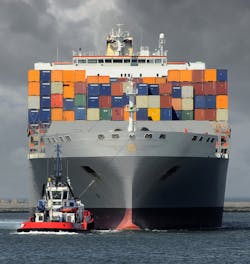Retail Imports Strong Despite Hanjin Bankruptcy
Import cargo volume at the nation’s major retail container ports should be at near-peak levels this month even as retailers work to cope with the Hanjin Shipping bankruptcy, according to the monthly Global Port Tracker report from the National Retail Federation and Hackett Associates.
Hanjin should not significantly affect volume for the month since alternative arrangements to unload those containers or shift cargo elsewhere should be dealt with by the time the numbers are tallied,” says Jonathan Gold, NRF’s vice president for supply chain and customs policy. “But millions of dollars worth of merchandise is in limbo at the moment, and retailers are working hard to make sure it ends up on store shelves in time for the holidays.”
Ports covered by Global Port Tracker handled 1.63 million twenty-foot equivalent units (TEUs) in July, the latest month for which after-the-fact numbers are available. That was up 3.2% from June and up 0.7% from July 2015. One TEU is one 20-foot-long cargo container or its equivalent.
August was estimated at 1.67 million TEUs, down 0.4% from last year, and is expected to have been the busiest month of the annual shipping-cycle buildup to the holiday shopping season. September is forecast at 1.62 million TEUs, down 0.2% from last year; October at 1.63 million TEUs, up 5.3% from last year; November at 1.53 million TEUs, up 3.8%, and December at 1.49 million TEUs, up 3.6%.
Those numbers should bring 2016 to a total of 18.6 million TEUs, up 1.8% from last year. Total volume for 2015 was 18.2 million TEUs, up 5.4% from 2014. The first half of 2016 totaled 9 million TEUs, up 1.6% from the same period in 2015. January 2017 is forecast at 1.53 million TEUs, up 2.8% from January 2016.
“Despite the apparent slowdown in economic activity being reported around the world, the volume of imports continues to grow slowly, much along the lines that we have been projecting,” says Ben Hackett, founder of Hackett Associates.
Global Port Tracker, which is produced for NRF by the consulting firm Hackett Associates, covers the U.S. ports of Los Angeles/Long Beach, Oakland, Seattle and Tacoma on the West Coast; New York/New Jersey, Hampton Roads, Charleston, Savannah, Port Everglades and Miami on the East Coast, and Houston on the Gulf Coast.
